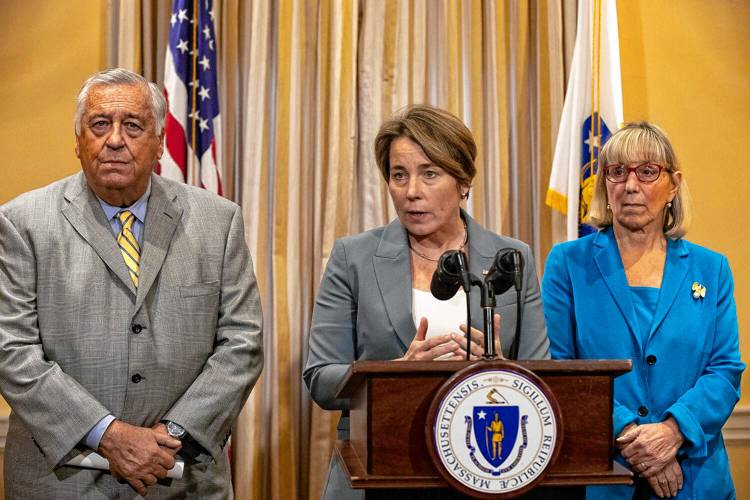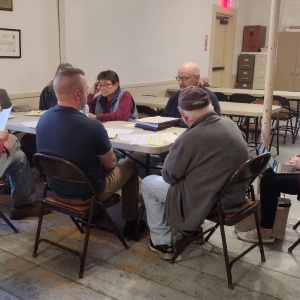House to review $250M shelter funding in Healey’s spending bill

House Speaker Ronald Mariano, Gov. Maura Healey, and Senate President Karen Spilka take reporters' questions in the governor's lobby on Monday, Nov. 6. PHOTO BY SAM DORAN/STATE HOUSE NEWS SERVICE
| Published: 11-07-2023 5:00 PM |
BOSTON—The House seeks to steer more funds to the state’s strained emergency shelter system as part of a spending bill it plans to consider on Wednesday.
Gov. Maura Healey requested $250 million from the Legislature in September to supplement $325 million in the fiscal 2024 state budget and continue running a shelter system that is serving twice as many families as this time last year.
House Speaker Ron Mariano confirmed the House plans Wednesday but did not specify the amount that it plans to allocate for the migrant crisis in its supplemental budget. The Healey administration supplied representatives with a “lot of information” that they’d been seeking about the governor’s request for expanded migrant funding, Mariano said.
The state’s emergency assistance shelter system is slated to hit the administration’s imposed capacity of 7,500 families in “the next day or so,” Healey said Monday.
There were 7,439 families housed in the shelter system as of Monday, compared to 7,423 families on Friday, according to the Executive Office of Housing and Livable Communities. Of those, about half are immigrants who recently arrived in the United States, administration officials have said.
The $325 million allocated in the state budget for the Emergency Assistance system was based on a caseload of around 4,100 families throughout the fiscal year. Administration officials said that if the caseload remained around 7,500 families for the rest of the fiscal year, it would still need $210 million more than the $325 million to fulfill shelter costs. The current $325 million would last through January.
Healey emphasized Monday that the $250 million, if allocated, wouldn’t remove the shelter cap, as the governor said the commonwealth lacks enough physical shelter space and human service providers to manage the deluge of immigrant families, in addition to Bay Staters experiencing homelessness.
Asked if any amount of money from the Legislature directed toward the shelter system would be enough to stop the state from turning families away, Healey replied, “It’s not just dollars.”
Article continues after...
Yesterday's Most Read Articles
“Dollars are important, and that’s why we need and I stand with other governors asking for help,” she said. “We need federal funding. It’s also the case we need, you know, more personnel and we don’t have enough service providers. We don’t have enough physical space and that’s why we’ve been, you know, searching high and low for space.”
Answering the same question about whether the $250 million Healey requested was enough funding to remove the cap, Mariano said the maximum capacity was not contingent on the funding.
“The cap was never associated with the $250. I don’t know where that came from,” the Quincy Democrat said. “When we were talking about the $250, that was to get us through the end of the fiscal year. The cap is coming for the folks who are coming in after that, you know, that’s when–we can’t afford to fund this in perpetuity.”
Advocates at a rally last week called for lawmakers to approve additional money for the emergency shelter system and to prevent the cap from taking effect. Those participating in the rally carried signs that read “Speaker Mariano Fund Shelters $ Now!”, “President Spilka Fund Shelters $ Now!,” and “Fund Shelters for Kids Now!”
Rep. Peter Durant, a candidate in Tuesday’s special Senate election, told the News Service Monday that he intends to file an amendment to the supplemental budget to modify the state’s right-to-shelter law. It would specify that only legal residents of Massachusetts who have been here for at least three years qualify for emergency shelter, the Spencer Republican said.
“I think this has been something that we’ve been pushing for for a long time and that I think is important. We need to try to turn the spigot off,” Durant said, referring to the massive surge of migrants. “If it is ultimately accepted as written, it would apply to those here and I understand that could create a whole other problem but that’s certainly something I’m willing to talk with leadership about how it goes and see how we might be able to come to consensus with it.”
In a television interview Sunday, the governor said she hopes migrant families don’t end up taking shelter at Boston Logan International Airport or in hospital emergency rooms. A policy rolled out at Boston Medical Center over the summer said migrants could no longer take shelter in the emergency department, and that families should be sent to the place where they last stayed or another address in the commonwealth, according to The Boston Globe.
“You know, there are a lot of places in the country where people can go once they cross into the United States,” Healey said on WCVB’s On The Record. “And by the way, the federal government is allowing people into the United States. And my position has been, if you’re going to allow people in, then work with us states on getting people working – expedite those work authorizations.”
Healey and top Democrats in the Legislature have said they do not want to change or dismantle the state’s right-to-shelter law, which for 40 years guaranteed certain homeless families a right to state-subsidized housing. But some advocates have argued that by putting a cap on the number of families it will house, and therefore turning others away, the state has effectively ended the guarantee.
The administration filed emergency regulations last week that gave the Executive Office of Housing and Livable Communities the authority to set a limit on the number of families the shelter system would house. The regulations were filed minutes before a court hearing where advocates challenged the administration’s power to set that limit.
Senate President Karen Spilka pledged Monday that her branch will take up the supplemental budget in “short order” following discussions with lawmakers. There’s no Senate formal session scheduled this week, though Senate Democrats plan to meet in a closed-door caucus on Thursday morning.
The Ashland Democrat, asked whether the Senate would consider allocating more than $250 million for migrants, said, “Well, the request was for $250 at this point.”
“I believe as a state we need to help, but we also definitely need help from the federal government, and Congress needs to pass the funding that President Biden has asked for. Congress needs to pass immigration reform,” Spilka said. “And we need the work permits as the governor and the lieutenant governor have mentioned. We need help, and we need it now.”
Ahead of the press conference with Healey, Mariano and Spilka, the Legislature’s top budget writers – House Ways and Means Chairman Aaron Michlewitz and Senate Ways and Means Chairman Michael Rodrigues – exited the governor’s office. They were joined by Administration and Finance Secretary Matthew Gorzkowicz and Senate Minority Leader Bruce Tarr.
The Massachusetts Law Reform Institute, Massachusetts Coalition for the Homeless and Citizens’ Housing and Planning Association sent a letter to Healey, Lt. Gov. Kim Driscoll, Spilka and Mariano on Monday with recommendations to alleviate the shelter capacity crisis.
In it, the advocates urged the Legislature “to provide adequate funding to maintain safe spaces for families eligible for EA shelter in the short-term, as meaningful solutions to the capacity crisis will take time to implement.”
The housing and advocacy groups recommended that the state take steps to expand available services for newly-arrived immigrant families, such as immigration-specific legal needs, and designate central and regional coordinators to help manage resources across state agencies.
They also suggested bringing public housing units back online to be used for families in the shelter system, as well as to expedite access to programs like the HomeBASE rehousing program, which helps eligible homeless families pay their first and last month’s rent and security deposits.
Expanding HomeBASE was one of the initiatives Healey recently put in motion to response to the shelter capacity crisis, as well as creating a new job training initiative through the Commonwealth Corporation Foundation, spurring the MassHire State Workforce Board to work with shelters and employers to match new immigrants who are eligible to work with jobs.
After months of Healey calling on the federal government for both financial assistance and to increase the speed of work authorizations, the administration and U.S. Department of Homeland Security will host a “clinic” next week where migrant families will be able to apply for work authorization. Healey has repeatedly said this step is key to moving new arrivals from shelters to more permanent housing.

 Over $400M in shelter funding, new limits approved
Over $400M in shelter funding, new limits approved Royalston’s FinCom debates proposed salary increases
Royalston’s FinCom debates proposed salary increases PHOTO: Spectacular spire
PHOTO: Spectacular spire Locking up carbon for good: Easthampton inventor’s CO2 removal system turns biomass into biochar
Locking up carbon for good: Easthampton inventor’s CO2 removal system turns biomass into biochar